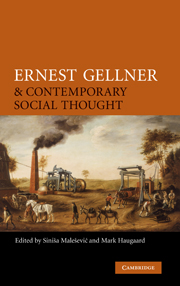Book contents
- Frontmatter
- Contents
- Notes on contributors
- Acknowledgements
- Introduction: an intellectual rebel with a cause
- Part I Civil society, coercion and liberty
- Part II Ideology, nationalism and modernity
- Part III Islam, postmodernism and Gellner's metaphysic
- 8 Islam, modernity and science
- 9 Truth, reason and the spectre of contingency
- 10 Gellner's metaphysic
- Index
- References
9 - Truth, reason and the spectre of contingency
Published online by Cambridge University Press: 22 September 2009
- Frontmatter
- Contents
- Notes on contributors
- Acknowledgements
- Introduction: an intellectual rebel with a cause
- Part I Civil society, coercion and liberty
- Part II Ideology, nationalism and modernity
- Part III Islam, postmodernism and Gellner's metaphysic
- 8 Islam, modernity and science
- 9 Truth, reason and the spectre of contingency
- 10 Gellner's metaphysic
- Index
- References
Summary
Introduction: the open society
As a philosopher, sociologist and anthropologist, Ernest Gellner was resolute in his defence of reason and objectivity as the path to truth, perceiving both the infallibility of doctrinal beliefs and the epistemic relativism of postmodern thought as the enemies of the one true path to knowledge. Gellner developed his epistemology through an extended critique of Karl Popper, although it was also the case that his debt to Popper was never in question (see Gellner 1985; 1993a: xi–xviii; 1993b; 1994b). Popper himself described epistemic relativism as ‘a betrayal of reason and of humanity’ (Gellner 1993b), and yet he also seems to have shared a core concern with at least some thinkers gathered under the umbrella term of postmodernism. In particular I am thinking of how Popper's thesis, as set out in The Open Society (1962; 1966) and The Poverty of Historicism (2002b), resonates with Foucault's argument, derived from his reading of Kant, that we should engage in a ‘permanent critique of ourselves’, and that we should be suspicious of all ideas and conceptual frameworks that promise a final emancipation (Foucault 1984). In the case of Foucault, the rationalism so dear to Popper (and Gellner) would be among such conceptual frameworks, which is where an imagined conversation between these thinkers would probably terminate. I have found no evidence of direct dialogue between Popper and Foucault, but a little book published by Gellner in 1992 brought them into an interesting, though indirect, relation.
- Type
- Chapter
- Information
- Ernest Gellner and Contemporary Social Thought , pp. 227 - 252Publisher: Cambridge University PressPrint publication year: 2007
References
- 4
- Cited by

